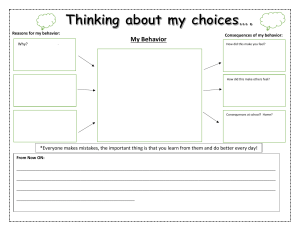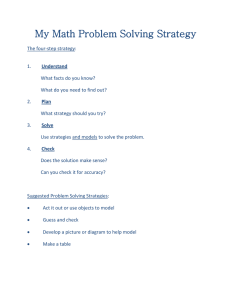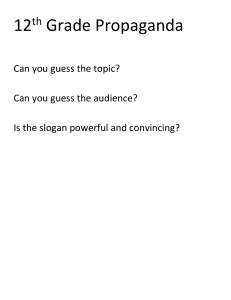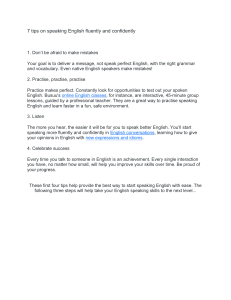Motivating Students to Speak English: Strategies & Activities
advertisement
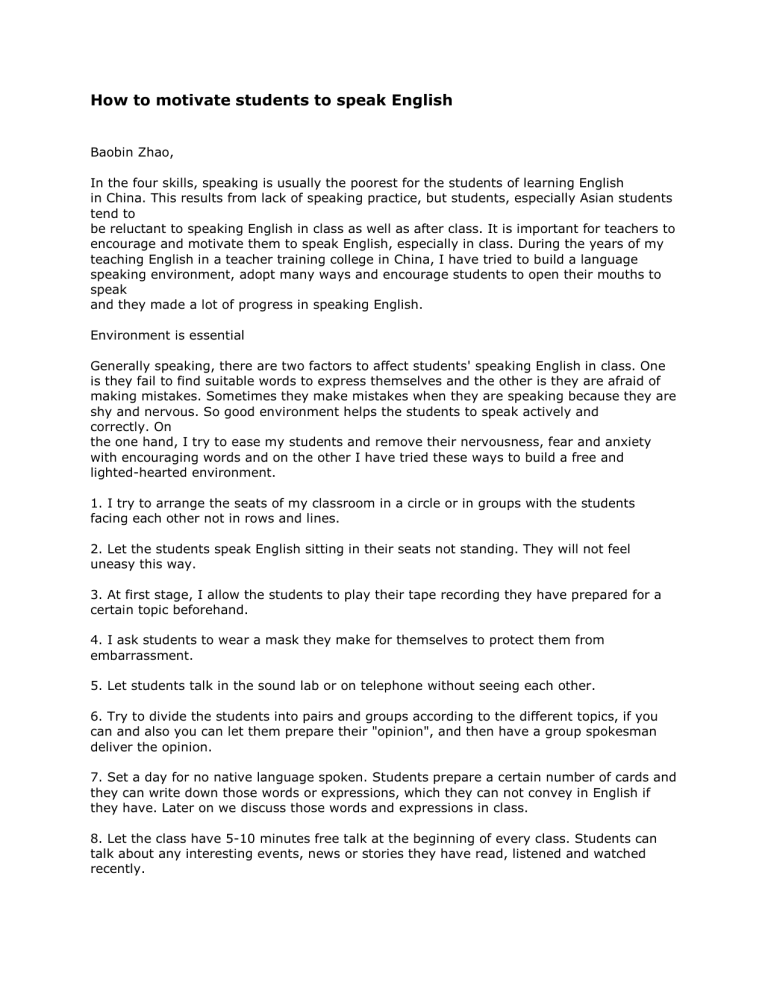
How to motivate students to speak English Baobin Zhao, In the four skills, speaking is usually the poorest for the students of learning English in China. This results from lack of speaking practice, but students, especially Asian students tend to be reluctant to speaking English in class as well as after class. It is important for teachers to encourage and motivate them to speak English, especially in class. During the years of my teaching English in a teacher training college in China, I have tried to build a language speaking environment, adopt many ways and encourage students to open their mouths to speak and they made a lot of progress in speaking English. Environment is essential Generally speaking, there are two factors to affect students' speaking English in class. One is they fail to find suitable words to express themselves and the other is they are afraid of making mistakes. Sometimes they make mistakes when they are speaking because they are shy and nervous. So good environment helps the students to speak actively and correctly. On the one hand, I try to ease my students and remove their nervousness, fear and anxiety with encouraging words and on the other I have tried these ways to build a free and lighted-hearted environment. 1. I try to arrange the seats of my classroom in a circle or in groups with the students facing each other not in rows and lines. 2. Let the students speak English sitting in their seats not standing. They will not feel uneasy this way. 3. At first stage, I allow the students to play their tape recording they have prepared for a certain topic beforehand. 4. I ask students to wear a mask they make for themselves to protect them from embarrassment. 5. Let students talk in the sound lab or on telephone without seeing each other. 6. Try to divide the students into pairs and groups according to the different topics, if you can and also you can let them prepare their "opinion", and then have a group spokesman deliver the opinion. 7. Set a day for no native language spoken. Students prepare a certain number of cards and they can write down those words or expressions, which they can not convey in English if they have. Later on we discuss those words and expressions in class. 8. Let the class have 5-10 minutes free talk at the beginning of every class. Students can talk about any interesting events, news or stories they have read, listened and watched recently. 9. Let students have an English class out of classroom with such activities as a class barbecue, picnic and party. 10. Build an English corner at the school and let students talk freely with those who are interested in learning English. It is essential to try to build an atmosphere where the students no longer feel shy, where they will voluntarily raise their hands to ask a question and where they will freely voice their own opinions. Encouragement is necessary After students finish their speaking in class, teachers should encourage them and let the students feel they have made some progress with a sense of their fulfillment. I try to do these: 1. Be firm in a gentle way and give them praise whenever they are doing anything close to a good job. 2. Be sincere and look for opportunities to find them doing something right. Never get frustrated, angry and impatient. 3. Be a nice, sensitive, and approachable person at all times. Never single students out or put them on the spot. 4. Treat them with kindness and respect. Smile a lot and value their opinions. Never embarrass anyone for a laugh. 5. Allow the students to be themselves rather than expecting them to conform to your preconceived ideas about how they should behave. Build their trust, take your time, and wait for them to come to you. Of course you should point out some apparent mistakes in their speaking, for example, the incorrect words in pronunciation or some serious mistakes in grammar after they finish their speech. Methods are important It is very important for the teachers to adopt as many ways as possible to let students to practise English in class. I believe the success of this teaching strategy is due mainly to the fact that the learners can choose what they want to read, listen to, watch, and talk about in class. I try the following ways to do the practice. 1. Free talk: First I try to choose those topics that have something to do with their interest and experience and also choose those subjects that students understand that there is no "right" answer, and the teacher is not judging their ideas, such as holidays, nature, ads, environment and pollution. Sometimes let students have complete freedom to choose the topics whatever they want to talk about. In their learning logs, students keep a record of what they have read and what they have listened to. They usually like to talk about such topics as movie stars, songs, music, magazines, sports and travel. 2. Retelling: Ask students to retell a story they have read, listened and watched. 3. Role playing: Ask students to practise situational dialogues by doing role plays, such as in the medical clinic, at the station, at the post office, in the restaurant and in the shop. 4. Debating: First try to choose some debatable topics such as who is more cleverer? boys or girls? Is the computer game useful or harmful for the students? Then I let them discuss in pairs for 10 minutes. After 10 minutes of discussion in pairs, I divide the class into two groups; each representing their own real belief. Finally I let each group debate the other. I act as a guide to help the debate along and nudge some of the silent students to talk. Almost all the students take part and the class is lively and active. 5. Storytelling: I ask students to tell stories with right intonation and pronunciation and gesture and expressions. I also ask students to invent improvised stories by being provided with situation and characters. Students can get a lot of fun from it. 6. Talking according to the picture: Show students some cartoon pictures, or humorous pictures. Let them talk freely. 7. Short play: I find that students enjoy short plays because students understand that the atmosphere is cooperative -- students helping each other understand the main points of the reading. I asked my students to make a short play about the text we have learned if possible. 8. Speech contest: Choose a topic to have a speech contest in class. I also let the students be a judge to give marks to the speakers. 9. Description: Ask students to describe to a certain thing or event. For instance, give your opinion on appearance after the teacher makes up and changes her clothes. Another example: find my friend. One student describes his/her friend and let the class guess who he/she is. 10. Acting and speaking: Let one student act as a certain profession, for instance a doctor examining a patient. The other student talks about the acts. 11. Speaking and acting: One person tells an act and the others should act as soon as possible, such as, touching your nose, running and asking his name. 12. Speaking and drawing: Let one student give some description and ask other students to draw what the student say, such as, the location of a place and a plan of a school. 13. Watching and speaking: 1) Let students to watch parts of cartoon film or some acts of TV play without any sound and voice and ask some of them to guess the meaning and talk about it. 2) Let one or two students watch and talk about only pictures of film or TV play without any sound. The other students imagine the scene by listening to the students' talking with their backs facing the TV set and then let them watch the program to compare. 14. Acting as an interpreter: Let one student act an interpreter and one as a foreigner and some students as local citizens. They communicate through interpretation, like shopping and sightseeing. 15. Problem solving: Give students some topic with some key words and ask them to solve a certain problem. For example, if you have these tools: a compass, a knife and a tin, how can you survive in the forest for a week? 16. Games: Students love games. I try to choose these games to have students practise. a) Twenty questions: One student has a word or some expressions in his mind. Other students guess the word by asking only general questions and alternative questions. The student answers them only with "yes" or " no". If the students can guess the word or the expression in less than twenty questions, they win, otherwise they lose. b) Taboo word description: One student thinks of a certain word in his mind and describe it without mention some words which have something to do with the word. For example, the word "book", you cannot mention the words: book, letter and paper. Another student acts as a judge. Other students listen. If the student mentions those taboo words, he will lose. c) Listen and guess: One student writes a word or a sentence or a job on the blackboard and the other student describes it with gestures but without mentioning the word itself. Other students sit without facing the blackboard and guess the word by the student's description. d) Repeat and add: First, one student says a sentence of an improvised story. The next student repeats the sentence and adds another one. Then next student repeats the sentences and adds one more sentence. This will go on and see who will repeat without missing the sentences they have said. Finally this will make a funny story. The student who can say the story fully will win. e) Speaking and guessing: First choose four students to come to the front or in the middle of the circle with their hands over their ears to prevent them from hearing anything and then show other students an expression or a sentence without letting the four students see it. Finally the students try to tell the four students the meaning of the word or expression that they saw with gestures. The student who guesses right or close right will win. f) Right or wrong: First ask 4 students to come to the front and other students ask them some alternative questions or tag questions concerning knowledge, such as, geography, history,music and arts, then the four students try to answer them. The student who answer the biggest number of the questions correctly will win. Teachers should invent more ways to let students practise. This will arouse their interest to speak and help them more easily to master this skill. Guidance is helpful Teachers play an important role in making the class lively and active by their guide and arrangement. Students' initiatives should be encouraged and respected, but it does not mean there is no guide or assessment on the part of the teacher. After all, the guidance and help of the teacher makes his job inevitable in the classroom and education. I try to do these: 1. I try to use many gestures, vivid language and clear expressions in class. 2. I always act as an actor as well as a conductor giving demonstrations and showing them first such as retelling, free talking and storytelling. 3. I give students enough time to prepare what they want to speak. I provide the students with a conversation planning worksheet for this purpose. The conversations can vary in length depending on the level of the class. I think it necessary to give students time to plan what they want to say. 4. Let students know the day before what they will be expected to participate in the next day. Sometimes I will give a handout that asks for opinions and tell the class that I expect each student to have at least one with very low level or particularly shy students, I am more than willing to have them say what they have written down. 5. I ask the students to try to memorize the whole thing, but if I smell rote, I break it up by asking questions and try to let them to think and say in their own words. 6. It is not uncommon for learners to feign understanding when in conversations with one another. I also believe that when learners repeatedly feign understanding, they have lost important opportunities to practice conversation strategies. I encourage students to say: " I beg your pardon" if you fail to understand your partner. 7. I try to teach students to concentrate your attention on the important information of the speech rather than every word that your partner says. 8. I try to explain some cultural background before students talk about a certain subject. Let them know the differences between the two cultures, for instance, the courses of a meal to help their speaking and understanding.. 9. In speaking I asked the students to focus on fluency over accuracy. Don't think too much of grammar. However, I remind the students some influence from our mother tongue, such as the confused sounds [au and ):] as in the words "house" and "horse" and the easily swallowed sounds [l] and [n] as in the words "government" and "children". 10. Try first to call those students who express and act better to serve as examples. Then call those students who are poorer in English expressing and acting. Teachers should invent more ways to let students practise. This will arouse their interest to speak and help them more easily to master this skill. Conclusion In my experience of teaching, I find students actually have a strong desire to speak. They are reluctant to speak because they are afraid of making mistakes and failing to find suitable words to express themselves well. If the teach try to encourage them to speak by using as many ways as possible and creating a good language speaking environment, students will speak actively, willingly and naturally. Speaking as one of the four skills, can be mastered only through practice. Practice makes perfect. Baobin Zhao baobinzhao@yahoo.com.cn English Department Cangzhou Teachers' College Hebei P.R. China 061001 Tel: 0317-2033784; Fax: 0317-3033554
